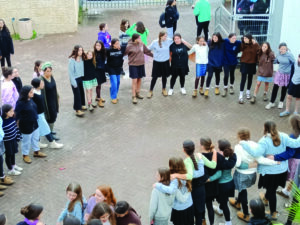An Israeli woman named Ayala Rolub made history this month, when she became the first woman voted onto the council of the Israel Garage Association, the official representative of all Israeli garages and their employees since 1942. On its Facebook page, the association wrote, “We are proud of the work and vision brought by Ayala Rolub, the first woman ever elected to the council, and we are confident that Ayala will open a large gateway for integrating women in the garage industry.”
Ms. Rolub might soon be joined in the industry by two 11th-grade AMIT students at the Elaine Silver Technological High School in Beersheva, who also made history by becoming the first two female students—including the first Ethiopian girl ever—to enroll in the vocational school’s automotive electronics track.
“We have entered an era in which women are not afraid—they are not afraid to get dirty,” said Mazal Ben Shimol, who has worked at Elaine Silver for 19 years and today is the school’s coordinator for a program called “Taasiyeda,” whose name combines the Hebrew words for industry (taasiya) and knowledge (yeda), and that aims to instill scientific and technological values in Israeli children.
When the two girls, Naria Amrani and Malka Rata, both almost 16 years old, told Ben Shimol that they wanted to pursue automotive studies, she said to them, “’Girls, do you know what you’re getting into? You’ll get dirty, there’s grease and ointments and grimy materials.’” And they replied, “That’s what we want.”
“So, we are giving them the opportunity to learn,” said Ben Shimol.
Giving students an opportunity to learn is the sole purpose of the AMIT Elaine Silver Technological High School, which caters to a student body of more than 100 at-risk youth in grades 9–12.
Students comes from households at the lower end of the socioeconomic spectrum, some come from broken homes or families with a criminal background. The students represent a religious cross-section, and come from Orthodox, traditionally religious, and secular families.
The school and its staff do everything to boost the students’ confidence and give them hope for their future by enabling them to earn a full matriculation certificate (bagrut) or a technological or vocational diploma.
“Sometimes students come to us after a year or two of not being in school or an academic setting, or not being in school at all, and they need extra help,” said Ben Shimol, adding that when students express interest in a particular field, the teachers and the school’s principal, Tzipi Harpenes, do their utmost to help them succeed.
In Naria Amrani’s case, her decision to pursue automotive studies came about when she was talking with Harpenes about what track to pursue. Naria told her that she wasn’t really interested in the school’s other tracks, which include information technology, graphics and design, and woodworking.
“I told Tzipi, ‘Maybe I’ll join the automotive track’ and she was very excited about the idea, and the idea of having the first girl join that program,” she said.
“I’m really interested in it for now,” she said, adding that she doesn’t mind that it’s perceived as a male profession. “I don’t care what people say or about the stigma of it being so-called boys’ work.”
Amrani scored 100 on the safety test that the auto students had to take in order to be able to work in a garage as part of the program. When her parents learned that she passed with a perfect score, they became more enthusiastic about Naria’s pursuit.
According to Ben Shimol, Naria’s father said, “If my daughter decides that she likes it, who am I to tell her no? Who said this profession is no good?”
Malka Rata also wanted to prove that girls have a place in this traditionally male field.
“Everyone says that this is men’s work, but Naria and I wanted to show that it’s not only for men,” said Malka. “We’re not like girls who go into a garage and get oil on their hands and say, ‘Ew, that’s gross.’ We come from a different world.”
Rata had attended another area school, but transferred to AMIT because she wanted to learn a vocation and complete her bagrut.
Cars have appealed to her for some time, she said, describing how on elementary school trips, she and her friends would look out the bus window and say, “this car is this make and that car is that make.”
Rata’s ultimate goal is to manage a garage and pursue additional studies.
For now, the girls and the boys in their class will work in a local garage once a week for six hours. Ben Shimol said that the garage owner told her, “I want these kids to work for me, I’ll even arrange work for them on vacations and breaks.”
The class toured the garage recently where, Ben Shimol said, the girls were over the moon.
“The world is advancing and developing with the media and technology,” she said. “When you go to a garage, they don’t just tell you, ‘Pop the hood and let’s look at the engine,’ they say, ‘Wait, let’s hook up a cable to the computer—in new cars there’s a special connection to the computer—and the girls were just thrilled the whole time we were there.”





